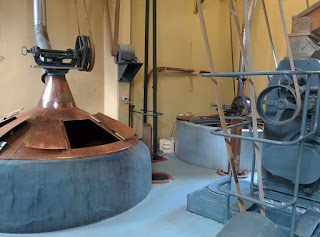 |
| The Cantillon logo on the side of a crate in their warehouse. |
This stop was especially exciting for me since I was feeling that the number of brewery stops we had done in Belgium was a little on the low side. I had imagined that we'd spend our rainy Belgian days getting tours a various small brew houses and sitting in their cozy tap rooms by the fire, much like we did our first stop in Bruges. But that type of thing was not really possible. The cities and towns of Belgium don't really have the dozens of breweries that they used to have. The remaining Belgian breweries are quite scattered across Belgium, and many of the well known ones are located in small towns that are not convenient to get to or piece together in a day via public transit. So I was quite happy we were fitting in one stop more before our departure.
Cantillon specializes in Lambic beers, which seems to be a dying art because of the time and resource commitment. A Lambic is a wheat beer that is produced using spontaneous fermentation. This means that instead trying to carefully control the type of yeasts and bacteria that their beer gets exposed to, they purposefully expose their beer to the open air to let wild yeast and bacteria ferment and change the taste of their beer. As a result of this, the fermentation process takes a lot longer to finish, upwards of three years or more. It is also difficult to control the flavor of the beer with spontaneous fermentation. But they can maintain some level of consistency by either blending different batches of various ages together (aka Gueuze Lambics) or by adding in fruit (aka Fruit Lambics) or caramel & candied sugar (aka Faro Lambics).
Upon arrival we were told they had a self-guided tour available which finishes with a two-pour tasting. Perfect! We were given an English booklet, a bit of instruction on how the tour works, and were sent on our way. As you can see from the pictures below the tour was awesome and the beer at the end of unique and delicious. I now have a new appreciation for Lambic beer.
 |
| The mashing tun: where the wort is made |
 |
| Nate reading up on all the machinery in the first room of the self-guided tour |
 |
| Getting excited about hot water (I'm standing under the water water tank) |
 |
| The top/inner-workings of the mashing tun |
 |
| Room 2: hop boiler, crushing machine, and a hot water tank |
 |
| Inside the hop boiler |
 |
| The granary where all the ingredients are stored |
 |
| The cooling tun |
The cooling tun is part of what makes Cantillon Brewery's beer unique. They pump their beer into that shallow open-air container to cool. The wort needs to reach a temperature of 64-68 F. This is really only possible at night in cold weather which means their brewing session is only from the end October to the beginning of April. They have done research on the organic chemistry of their fermentation process and found 100 different strains of yeasts, 27 strains of acetic acid bacteria, and 38 strains of lactic acid bacteria in just one type of Lambic. We've seen these types of cooling areas in other breweries, but they're always there just for historical purposes. This was the first one we've ever seen still being used.
 |
| The fermentation vat, where definitive temperature and degree Plato readings are taking. |
 |
| The barrel store: oak and chestnut casts of various sizes |
 |
| Nate in Lambic heaven |
 |
| Rows and rows of aging beer |
 |
| A very active barrel blowing out foamy fermentation bi-products Each barrel will lose 5 to 10 liters of wort during this more rapid fermentation stage |
 |
| The blending room This is where a true brewer's expertise is needed to find the perfect combination of various ages of beer or fruit to mix together to make the perfect beer. |
 |
| A blending schedule |
 |
| Barrel cleaning area |
 |
| The very busy bottling line |
 |
| End of the bottling line |
 |
| The cellar filled with stacks of bottles and crates |
 |
| First Tasting: Three year old Lambic fresh from the barrel |
 |
| Nate and I enjoying our Lambics |
 |
| For the second tasting we got to pick from one of three options: A cherry, a raspberry, and a Gueuze Lambic. Luckily there were three of us, so we got one of each. Delicious! |

No comments :
Post a Comment
Note: Only a member of this blog may post a comment.